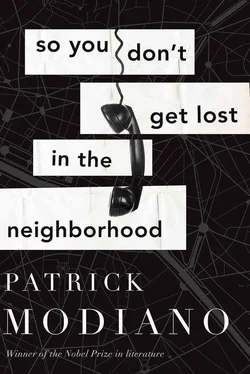He sat at his desk. Beneath the pages of the “dossier”, he discovered the photocopy of page 47 of his novel, Le Noir de l’été , where there was a mention, apparently, of this Torstel. The name was underlined, by Gilles Ottolini no doubt. He read:
In the Galerie de Beaujolais, there was indeed a bookshop behind whose window some art books were displayed. He went in. A dark-haired woman was sitting at her desk.
“I should like to talk to Monsieur Morihien.”
“Monsieur Morihien is away,” she told him. “But would you like to speak to Monsieur Torstel?”
That was all. Not much. The name was not mentioned except on page 47 of his novel. And that night he really didn’t feel like searching among the typewritten pages without double-spacing of the “Torstel” file. A needle in a haystack.
He recalled that on the lost visiting card there had indeed been the address of a bookshop, in the Palais-Royal. And perhaps the telephone number was that of the bookshop. But after more than forty-five years, these two pathetic details were not enough to set him on the trail of a man who was now no more than a name.
He lay down on the sofa and closed his eyes. He had decided to make an effort and to take himself back in time, if only for a moment. He had begun the novel, Le Noir de l’été , in the autumn, the same autumn when he had gone to Le Tremblay one Sunday. He remembered he had written the first page of the novel that Sunday evening in the room in square du Graisivaudan. A few hours earlier, when Torstel had been driving along the banks of the Marne and then crossed the Vincennes woods, he really had felt affected by autumn: the mist, the smell of damp earth, the paths strewn with dead leaves. The word “Tremblay” would always be associated for him now with that particular autumn.
And so would the name Torstel which he had once used in the novel. Simply because of its resonance. That is what Torstel conjured up for him. There was no need to look any further. It was all he had to say. Gilles Ottolini would no doubt be disappointed. Too bad. After all, he was not obliged to give him any explanation. It was none of his business.
Almost eleven o’clock in the evening. When he was at home on his own at that time, he often experienced what is known as “momentary flagging”. Then he would go into a neighbourhood café that stayed open very late at night. The bright light, the hubbub of noise, the comings and goings, the conversations in which he deluded himself he was participating, all this helped him overcome his momentary flagging after a short while. But for some time, he had no longer needed to resort to this expedient. It was enough for him to look out of his study window at the tree planted in the courtyard of the adjoining building, which retained its leaves much later than the others, until November. He had been told that it was a hornbeam, or an aspen, he was not sure. He regretted all the lost years when he had not paid sufficient attention to either the trees or the flowers. He, who no longer read any books other than Buffon’s Histoire naturelle , suddenly recalled a passage from the memoirs of a French philosopher. She had been shocked by what a woman had said during the war: “After all, the war doesn’t alter my relationship with a blade of grass.” She probably reckoned that this woman was frivolous or indifferent. But for him, Daragane, the phrase had another meaning: in periods of disaster or mental anxiety, all you need do is look for a fixed point in order to keep your balance and not topple overboard. Your gaze alights on a blade of grass, a tree, the petals of a flower, as though you were clinging on to a buoy. This hornbeam — or this aspen — on the other side of his windowpane reassured him. And even though it was almost eleven o’clock at night, he felt comforted by its silent presence. Therefore, he might as well be done with it straight away and read the typed pages. He had to face the facts: Gilles Ottolini’s voice and physique had at first glance struck him as those of a blackmailer. He had wanted to overcome this prejudice. But had he really managed to do so?
He removed the paperclip that held the sheets together. The photocopying paper was not the same as the originals. He remembered when Chantal Grippay was doing the photocopying how flimsy and transparent the pages were. They had reminded him of “airmail” notepaper. But that was not entirely correct. It was rather that they had the same transparency as the onionskin paper used for police interrogations. And besides, Chantal Grippay had told him: “Gilles was able to obtain information from the police. .”
He cast a last glance at the foliage of the tree, in front of him, before beginning his reading.
The print was tiny, as though it had been typed on one of those portable machines that no longer exist nowadays. Daragane felt as though he was diving into a thick, indigestible broth. Occasionally, he would skip a line and would then have to go back again, with the help of his index finger. Rather than a coherent report, it consisted of some very brief notes, placed end to end in the greatest possible muddle, concerning the murder of a certain Colette Laurent.
The notes retraced her career path. Arrival in Paris when very young from provincial France. Job in a nightclub in rue de Ponthieu. Room in a hotel in the Odéon district. She goes around with students from the École des Beaux-Arts. List of people questioned and whom she may have met in the night club, list of students at the Beaux-Arts. Body found in a hotel bedroom, 15th arrondissement. Interrogation of the owner of the hotel.
So was this the news item that interested Ottolini? He broke off from his reading. Colette Laurent. This apparently anodyne name aroused an echo in him, but too muted for him to be able to describe it. He seemed to have read the date: 1951, but he did not feel like verifying this among the words that were all huddled together and made you feel as if you were suffocating.
1951. More than half a century had gone by since then, and the witnesses to this news item, and even the murderer himself, were no longer alive. Gilles Ottolini had got there too late. This shit-stirrer would be left unsatisfied. Daragane regretted that he had described him in such a crude way. A few more pages to go. He still experienced this nervousness and this apprehension that had come over him when he had opened the “dossier”.
He gazed for a moment at the leaves of the hornbeam, which were quivering gently, as though the tree was breathing in its sleep. Yes, this tree was his friend, and he recalled the title of a collection of poems an eight-year-old girl had had published: Arbre, mon ami . He was jealous of this girl, because he had been the same age as her and because he, too, wrote poems at the time. What period did this date from? From a year during his childhood almost as long ago as the year 1951 in the course of which Colette Laurent had been murdered.
Once again, the tiny letters without double-spacing danced before his eyes. And he had to slide his forefinger along so as not to lose the thread. At last, the name Guy Torstel. It was linked to three names among which he was surprised to recognise that of his mother. The two others were: Bob Bugnand and Jacques Perrin de Lara. He vaguely remembered them, and this too went back to the distant period when the girl of his own age had published Arbre, mon ami . The first one, Bugnand, had the figure of a sportsman and wore beige. Dark-haired, he believed; and the other, a man with the large head of a Roman statue, who perched his elbow on marble fireplaces in an elegant pose when he spoke. Childhood memories often consist of small, trivial details that come from nowhere. Had these names attracted Ottolini’s attention and had he made a connection between them and he himself, Daragane? But no, certainly not. Firstly, his mother did not use the same surname as he did. The two others, Bugnand and Perrin de Lara, were lost in the mists of time, and Ottolini was too young for them to mean anything to him.
Читать дальше












